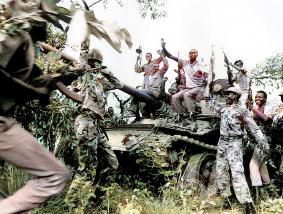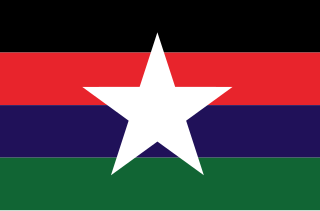
The rich and varied music of Sudan has traditional, rural, northeastern African roots and also shows Arabic, Western or other African influences, especially on the popular urban music from the early 20th century onwards. Since the establishment of big cities like Khartoum as melting pots for people of diverse backgrounds, their cultural heritage and tastes have shaped numerous forms of modern popular music. In the globalized world of today, the creation and consumption of music through satellite TV or on the Internet is a driving force for cultural change in Sudan, popular with local audiences as well as with Sudanese living abroad.

The Second Sudanese Civil War was a conflict from 1983 to 2005 between the central Sudanese government and the Sudan People's Liberation Army. It was largely a continuation of the First Sudanese Civil War of 1955 to 1972. Although it originated in southern Sudan, the civil war spread to the Nuba mountains and the Blue Nile. It lasted for almost 22 years and is one of the longest civil wars on record. The war resulted in the independence of South Sudan 6 years after the war ended.

Slavery in Sudan began in ancient times, and had a resurgence during the Second Sudanese Civil War (1983–2005). During the Trans-Saharan slave trade, many Nilotic peoples from the lower Nile Valley were purchased as slaves and brought to work elsewhere in North Africa and the Orient by Nubians, Egyptians, Berbers and Arabs.

The Sudan Liberation Movement/Army is a Sudanese rebel group active in Darfur, Sudan. It was founded as the Darfur Liberation Front by members of three indigenous ethnic groups in Darfur: the Fur, the Zaghawa, and the Masalit, among whom were the leaders Abdul Wahid al Nur of the Fur and Minni Minnawi of the Zaghawa.

Sudan University of Science and Technology is one of the largest public universities in Sudan, with ten campuses in Khartoum state. The main campus is located in the so-called Al Mugran area of Khartoum, the confluence of the White Nile and the Blue Nile.
The Rift Valley Institute (RVI) is an independent, non-profit research and training organisation working with communities and institutions in Eastern Africa, including Sudan, South Sudan, the Horn of Africa, and the Great Lakes region. Established in 2001, the RVI has offices in Kenya, the US and the UK.

Deng Alor Kuol is a South Sudanese politician. Currently the minister of East African Community Affairs in President Salva Kiir's government, he is a member of the Ngok Dinka ethnic group, and was born in Abyei region, an oil-producing border region between Northern and Southern Sudan. He’s also a brother to Achai Wiir, a South Sudanese renowned businesswomen.
Hon. Jemma Nunu Kumba is a South Sudanese politician. She is the current Minister of Gender, Child and Social Welfare of South Sudan. She founded the Sudan women Parliamentary Caucus in 2004 at the start of the comprehensive peace agreement. She was chosen by the SPLM as the speaker of the Revitalised Transitional National Legislative Assembly (R-TNLA). She became the first woman to preside over the parliament of South Sudan.

Human rights in South Sudan are a contentious issue, owing at least in part to the country's violent history.
The South Sudanese diaspora consists of citizens of South Sudan and descendants of South Sudanese origin residing abroad outside their homeland.
South Sudanese Australians are people of South Sudanese ancestry or birth who live in Australia.

Child marriage is a marriage or union between a child under the age of 18 to another child or to an adult. Child marriage is common in a multitude of African countries. In South Sudan, child marriage is a growing epidemic. Child marriage in South Sudan is driven by socioeconomic factors such as poverty and gender inequality. Current figures state that South Sudan is one of the leading countries in the world when it comes to child marriage. Child marriage has negative consequences for children, including health problems and lower education rates for South Sudanese girls. Many initiatives have been taken to combat child marriage in South Sudan, but the presence of societal norms and instability continues to drive its presence in the nation.

Nanjira Sambuli is a Kenyan researcher, writer, policy analyst and strategist interested in and working on understanding the unfolding, gendered impacts of ICT adoption on governance, media, entrepreneurship and culture.

Vivienne L’Ecuyer Ming is an American theoretical neuroscientist and artificial intelligence expert. She was named as one of the BBC 100 Women in 2017, and as one of the Financial Times' "LGBT leaders and allies today".
The Dallaire Institute for Children, Peace, and Security is an institute at Dalhousie University that works to end the recruitment and use of child soldiers. The initiative was founded by Roméo Dallaire and Jacqueline O'Neill in 2007, and is situated in Halifax, Nova Scotia with offices in Kigali, Rwanda and Juba, South Sudan.

Lual Mayen is a South Sudanese video game developer and video game designer. He was born at the Aswa refugee camp in Sudan. In 1993, his family relocated to a refugee camp in Uganda. He was born into a family of seven.
Omnia Shawkat is a Sudanese journalist, digital stories and cross-cultural curator. She is co-founder and manager of the cultural online platform Andariya, based in Sudan, South Sudan and Uganda, covering other countries in East Africa and the Horn of Africa as well.
Veronica Lucy Gordon is a South Sudanese journalist, radio broadcaster and rights activist who is the co-founder of the Association of Media Women in South Sudan (AMWISS). In 2014, she became the first female executive board member of the Association for Media Development of South Sudan (AMDISS).
Fatima Hassan is a South African human rights lawyer who works in the field of health justice.
Aguil Chut Deng Acouth, also known as Aguil de'Chut Deng or Aguil Chut-Deng, was a South Sudanese revolutionary and activist. She was a member of "Katiba Banat", the women's battalion of the Sudan People's Liberation Army (SPLA), during the Second Sudanese Civil War.










